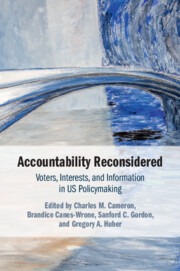Book contents
- Frontmatter
- Dedication
- Contents
- Figures
- Tables
- Contributors
- Acknowledgments
- 1 Introduction
- Part I Candidate Evaluation and Selection
- Part II The Media and The Informational Environment
- 6 Local Newspapers and Ideological Accountability in US House Elections
- 7 Inequality, or Invisibility and Inaccuracy? How Local Newspapers Cover the Occupational Backgrounds of Congressional Incumbents and Challengers
- 8 Congressional Accountability in the Contemporary Media Environment: Arguments, Data, and Methods
- Part III Policymaking, Information Provision, and Accountability
- Part IV Outside The Public Eye? Private Interests and Policymaking
- Bibliography
- Author Index
- Subject Index
7 - Inequality, or Invisibility and Inaccuracy? How Local Newspapers Cover the Occupational Backgrounds of Congressional Incumbents and Challengers
from Part II - The Media and The Informational Environment
Published online by Cambridge University Press: 09 February 2023
- Frontmatter
- Dedication
- Contents
- Figures
- Tables
- Contributors
- Acknowledgments
- 1 Introduction
- Part I Candidate Evaluation and Selection
- Part II The Media and The Informational Environment
- 6 Local Newspapers and Ideological Accountability in US House Elections
- 7 Inequality, or Invisibility and Inaccuracy? How Local Newspapers Cover the Occupational Backgrounds of Congressional Incumbents and Challengers
- 8 Congressional Accountability in the Contemporary Media Environment: Arguments, Data, and Methods
- Part III Policymaking, Information Provision, and Accountability
- Part IV Outside The Public Eye? Private Interests and Policymaking
- Bibliography
- Author Index
- Subject Index
Summary
Nicholas Carnes continues the focus on media and information, examining how local newspapers cover incumbents and challengers. Some voters may value information about the pre-election employment history of candidates, for instance, if voters believe Congress would benefit from members with a range of socioeconomic classes and work experiences. What do the media actually say about employment histories? Carnes examines the coverage of 32thirty-two House incumbents and their challengers running for reelection in 2006 (or their most recent contested election), selected to oversample those with a working- class background prior to taking office. Content analysis reveals that occupational backgrounds rarely receive much coverage. The backgrounds of challengers are more newsworthy, but overall coverage of this aspect remains modest. Instead, coverage near elections focuses on incumbent party, issue positions, and performance in office. This lack of information about class background is arguably problematic for descriptive representation, particularly if it would shape voter choices were it more frequently provided.
Keywords
- Type
- Chapter
- Information
- Accountability ReconsideredVoters, Interests, and Information in US Policymaking, pp. 150 - 172Publisher: Cambridge University PressPrint publication year: 2023

